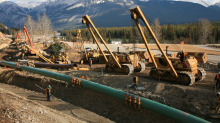U.S. firm says it has support to proceed with Trans Mountain pipeline
 United States firm Kinder Morgan Energy Partners LP said Thursday it would more than double the size of its Trans Mountain oil pipeline with a $5-billion project to add 550,000 barrels per day of capacity to the line that carries oil sands crude to Vancouver and Washington’s Puget Sound.
United States firm Kinder Morgan Energy Partners LP said Thursday it would more than double the size of its Trans Mountain oil pipeline with a $5-billion project to add 550,000 barrels per day of capacity to the line that carries oil sands crude to Vancouver and Washington’s Puget Sound.The company said a recent “open season” held to gauge shipper support for an expansion of the line showed that shippers were willing to commit as much as 660,000 bpd to the expansion for a 20-year term.
The revised project is larger than the $3.8-billion plan to double the size of the 300,000 bpd line that the company initially proposed in February before drawing back to look for additional customers willing to sign binding 20-year contracts to ship oil on Trans Mountain.
“We knew that as the project’s design was evolving it would allow for more commitments,” said Ian Anderson, president of Kinder Morgan Canada. “We also knew, or believed, that the market had some players in it … that might still be interested.”
Canadian oil producers have been urging development of a line to let them tap high-paying Asian markets and U.S. West Coast refineries. The majority of Canadian oil exports now flow to the U.S. Midwest, where a glut of crude at the Cushing, Oklahoma, storage hub has depressed prices.
Production from Alberta’s oil sands, the world’s third-largest crude oil reserve, is set to nearly double to 3 million barrels per day by 2020.
The Trans Mountain expansion is one of several pipeline projects in the works as Canadian oil producers look to tap new markets and avoid the discounts they face at Cushing.
Enbridge Inc.’s Northern Gateway project is also looking to move oil to a Pacific port, while Enbridge’s Gulf Access Project and TransCanada Corp.’s controversial Keystone XL pipeline are looking to push oil sands crude to the refining cluster on the U.S. gulf coast.
All the projects are fully backed by producers
“There is overwhelming demand for these pipelines,” said Chad Friess, an analyst at UBS Securities. “It shows the urgency, in producers’ minds, to close these regional oil price (discounts).”
Trans Mountain, which takes oil to Vancouver and refineries in British Columbia and Washington, is the only pipeline carrying Alberta oil sands crude to the Pacific. Space on the line has been rationed for months as customers look to ship more oil than it can handle.
The latest project, which could be completed in 2017, will rival Enbridge’s planned 525,000 bpd Northern Gateway pipeline to take oil sands crude to a deepwater port at Kitimat, on British Columbia’s northern coast.
Northern Gateway has already been delayed more than a year as stiff opposition from environmentalists and aboriginal groups caused regulatory hearings to stretch out to two years.
Alarmed by the delay to a project it considers to be in the national interest, the federal government plans time limits on hearings. Mr. Anderson welcomed the new rules, but he said they will not change the need to seek the support of those affected by the project.
“There’s no doubt that I hope to benefit from those changes … but (the new rules) will not reduce or limit the amount of engagement and local-interest consideration that we will have to undertake,” he said.
Kinder Morgan plans to file for approval of the project in 2014 and construction could begin in 2016. The project will twin the existing line, add new pumping stations and expand its Port of Vancouver docks to handle additional tanker traffic.
Trans Mountain runs 1,150 kilometres from Edmonton to Vancouver.
You can return to the main Market News page, or press the Back button on your browser.

